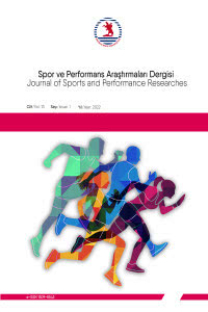GRAND SLAM TENİS TURNUVALARI FİNAL MAÇLARININ BAZI DEĞİŞKENLERE GÖRE ANALİZİ
Tenis, Grand Slam, Analiz, Başarı, Tenis
ANALYSIS OF FINAL MATCHES OF GRAND SLAM TENNIS TOURNAMENTS ACCORDING TO SOME VARIABLES
Analysis, Grand Slam, Success, Tennis,
___
- 1- Fernandez-Fernandez J, Mendez-Villanueva A, Pluim B M. Intensity of tennis match play, Br J Sports Med, 2006; 40: 387–391.
- 2- Tennis. https://en.wikipedia.org/wiki/Tennis (Erişim tarihi: 13 Eylül 2016).
- 3- Gelen E, Mengütay S, Karahan M. Teniste servis performansını belirleyen fiziksel uygunluk ve biyomekaniksel faktörlerin incelenmesi, Uluslararası İnsan Bilimleri Dergisi, 2009; 6(2): 668.
- 4- O’Donoghue P, Ingram B. A notational analysis of elite tennis strategy, J Sport Sci, 2001; 19: 107-15.
- 5- Fernandez-Garcia B. Match activity and physiological responses during a junior female singles tennis tournament, Br J Sports Med, 2007; 41: 711-716.
- 6- Gül M, Gül GK, Ceylan S. 2006 Avustralya açık tenis turnuvası erkekler çeyrek final, yarı final ve final maçlarındaki hatalı vuruşların bölgesel analizi, Dokuzuncu Uluslararası Spor Bilimleri Kongresi Muğla, 2006; 179-180.
- 7- Kandaz N. 2000 Wimbledon tenis turnuvası erkekler yarı final ve final maçlarında atılan servislerin istatistikî analizi, Sakarya Üniversitesi, Sosyal Bilimler Enstitüsü, Beden Eğitimi ve Spor Ana Bilim Dalı, Yüksek Lisans Tezi, Sakarya, 2001.
- 8- https://www.youtube.com/watch?v=uEDXMRYe0zo&t=12s (Erişim tarihi: 10 Eylül 2017).
- 9- Alpar R. Uygulamalı çok değişkenli istatistiksel yöntemlere giriş-I. Nobel Yayınları. Ankara, 2003.
- 10- Hizan H, Whipp PR, Reid M. Validation of match notation (a coding system) in tennis, Journal of Quantitative Analysis in Sports, 2010; 6(3): 1-11.
- 11- Reid M, Morgan S, Whiteside D. Matchplay characteristics of Grand Slam tennis: implications for training and conditioning, Journal of Sports Sciences, 2016; 34(19) :1791-1798.
- 12- Filipcic T, Filipcic A, Berendijas T. Comparison of game characteristics of male and female tennis players at Roland Garros, Acta Univ Palacki Olomuc Gymnica, 2008; 38(3): 21-28.
- 13- Kilit B, Arslan E. 2016 Rio Olimpiyat Oyunları tenis müsabakalarının analizi, International Journal of Science Culture and Sport, 2016; 4(3): 682-688.
- 14- Reid M, Schneiker K. Strength and conditioning in tennis: current research and practice, Journal of Science and Medicine in Sport, 2008; 11(3): 248-256.
- 15- Maquirriain J, Baglione R, Cardey M. Male professional tennis players maintain constant serve speed and accuracy over long matches on grass courts, European Journal Of Sport Science, 2016; 16(7): 1-5.
- 16- The longest match in history. http: //www. wimbledon. com/en_GB/news/ articles/2015 0624/the_longest_match_in_history.html, 2015 (Erişim tarihi: 13 Eylül 2015).
- 17- Kilit B, Suveren S, Şenel Ö. Elit Türk tenisçilerin taktik durumlarının “5 oyun durumu” açısından analizi, Uluslararası İnsan Bilimleri Dergisi, 2011; 8(1): 1629-1642.
- 18- Antoun R. Tactical trends in women‘s tennis. Manager of women‘s tennis at the tennis academy, erişim adresi; Url:http//www.itftennis.com/shared/ medialibrary/pdf/original/ıo_6672_original.pdf 2008.
- 19- Kilit B, Arslan C, Akçınar F, Rad AG. Elit erkek tenis maçlarının notasyonel analizi, Uluslararası İnsan Bilimleri Dergisi, 2012; 9(2): 1311-1320.
- ISSN: 1309-5110
- Yayın Aralığı: Yılda 3 Sayı
- Başlangıç: 2010
- Yayıncı: Ondokuz Mayıs Üniversitesi Yaşar Doğu Spor Bilimleri Fakültesi
ANAEROBİK EGZERSİZİN TAKIM SPORLARINDA BASİT GÖRSEL VE İŞİTSEL REAKSİYON ZAMANLARINA AKUT ETKİSİ
DAVUT SİNAN KAPLAN, FIRAT AKCAN, CANER YILDIRIM, MUSTAFA ÖZDAL, Ali Paşa KISAK, MÜRSEL BİÇER
PROSOSYAL VE ANTİSOSYAL DAVRANIŞ İLE SPORCU KİMLİĞİNİN BAZI DEĞİŞKENLERE GÖRE İNCELENMESİ
RECEP GÖRGÜLÜ, GAMZE ELİF ADİLOĞULLARI, Ömer Macit TOSUN, İLHAN ADİLOĞULLARI
FARKLI ISINMA PROTOKOLLERİNİN 1-MAKSİMUM TEKRAR SKUAT PERFORMANSI ÜZERİNE AKUT ETKİSİ
MUHAMMED EMİN KAFKAS, İsmail İLBAK, ÖZGÜR EKEN, FAHRİ SAFA ÇINARLI, Armağan Şahin KAFKAS, NURKAN YILMAZ
MEHMET YILDIZ, Sebiha GÖLÜNÜK BAŞPINAR, YÜCEL OCAK, Zeki AKYILDIZ, Melih BOZDEMİR
GRAND SLAM TENİS TURNUVALARI FİNAL MAÇLARININ BAZI DEĞİŞKENLERE GÖRE ANALİZİ
FARKLI İLLERDEKİ ORTAOKUL ÖĞRENCİLERİNİN BEDEN EĞİTİMİ DERSİNE KARŞI TUTUMLARININ ÖLÇÜLMESİ
